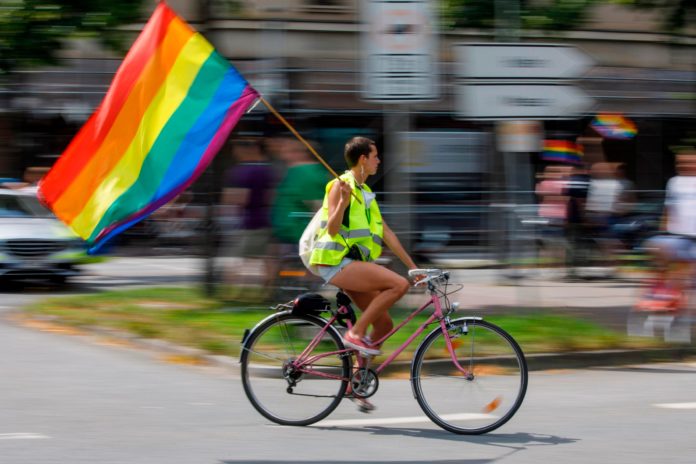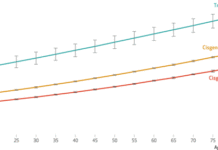
TOPSHOT – A participant on a bicycle with a rainbow flag takes part in a cycling rally as a … [+]
With the United States Supreme Court apparently poised to overturn Roe vs. Wade’s protection for abortion access, some court watchers warn that protections for LGBTQ+ rights could be next.
According to a recently released survey of 520 Americans who identify as LGBTQ+, many already face discrimination in the healthcare space.
The survey, conducted by health insurance website HealthCare.com, included 520 respondents, 40% of whom identified as bisexual, 30% as gay, 12% as lesbian, and 18% as something else, such as transgender, pansexual, questioning, or queer.
One in eight LGBTQ+ Americans surveyed said they have experienced discrimination from their health insurance provider. Among subgroups, such as people who identify as transgender or bisexual, it may be even higher, though the samples sizes for these subgroups were not sufficient to draw definitive conclusions.
Younger people were more likely to report experiencing discrimination. Approximately one in five Millennial (22%) and Gen Z (20%) respondents said they’ve experienced discrimination from their health insurance providers. By contrast, only 3% of Baby Boomers and 11% of Gen X respondents reported insurance-related discrimination.
These findings are consistent with evidence that LGBTQ+ patients face discrimination from healthcare providers as well. According to a report from the Center for American Progress, one in ten LGBTQ+ Americans experience mistreatment by a healthcare provider.
MORE FROMFORBES ADVISOR
The optimistic news is that 32% of HealthCare.com survey respondents think health insurance is improving for LGBTQ+ Americans while a smaller percentage (13%) think it is getting worse.
Health Insurance Status and Costs
Respondents in the survey reported a range of health insurance coverage. One-third were covered by Medicare, 23% by an employer, 18% by Medicaid, and 10% through a federal or state health insurance marketplace.
Just 7% of respondents had no health insurance—slightly lower than the general population though within the survey’s margin of error—though government data has shown that overall, LGBTQ+ Americans are slightly more likely to be uninsured than non-LGBTQ+ people. Coverage disparities are more stark for some groups of LGBTQ+ people. Specifically, transgender people are more likely to be uninsured and to report cost-related barriers to care, according to the Kaiser Family Foundation.
Without health insurance, finding affordable healthcare services can become a huge barrier, according to Dr. Maria C. Monge, associate professor of pediatrics, internal medicine, and medical education and division director for adolescent medicine at Dell Medical School at the University of Texas at Austin.
“The cost of just the premiums—and that’s not even the deductible—makes it, for some folks, feel like [health insurance is] not worth it,” Monge said. “Even if you’re in a state that has options, folks can’t afford that.”
Coverage Confusion
Even people with health insurance aren’t sure they have coverage for what they need, the HealthCare.com survey showed.
A majority (60%) of respondents said they were unsure if their health insurance covers services often sought by LGBTQ+ patients, such as gender-affirming medication, gender-affirming procedures, Pre-Exposure Prophylaxis (PrEP) to prevent HIV, or fertility treatments. Another 20% said their health insurance does not cover any of these services and 10% said their health insurance covers gender-affirming hormones and PrEP.
Without insurance coverage, the care people need can be prohibitive. For example, of survey respondents who said they do not take PrEP, 20% said it’s too expensive and insurance doesn’t cover it.
Financial Reserves
Despite challenges, LGBTQ+ respondents are better off than the general public when it comes to certain aspects of health insurance and personal finance related to healthcare.
For example, nearly one-quarter (24%) of respondents said they have $6,000 in savings compared to just 14% of the general population.
Those financial resources may help explain why 39% of LGBTQ+ respondents reported having medical debt compared to 45% in a prior HealthCare.com survey and as many as 50% according to other sources.
Respondents who identify as gay were even less likely to have medical debt, with 75% reporting none. On the other hand, younger respondents were more likely to have debt, with 56% of Millennials owing money for medical bills.
Overall, for one in three respondents with medical debt, the amount is over $1,000.
More than half (53%) of respondents were somewhat or very concerned that a major health issue could lead to medical debt or even bankruptcy. Among Millennials, that figure was 63%.
Reducing anti-LGBTQ+ discrimination and barriers to care should be a concern for everyone, according to Monge, not just for LGBTQ+ people.
“The health of a person is only as good as the health of their community,” she said. “We should be concerned about our communities’ health and not just our own, because we can’t ever be healthy unless everybody is.”








